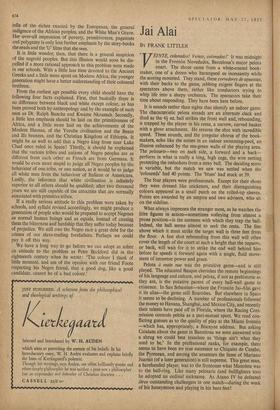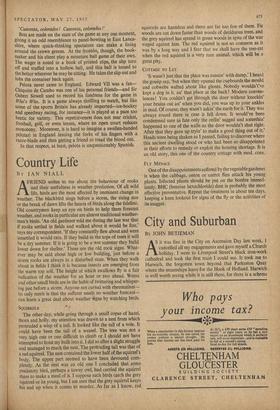Jai Alai
By FRANK LITTLER V ' EINTE, colorados! Veinte, colorados!' It was midnight in the Fronton Novedades, Barcelona's major pelota court. The shout came from a white-coated book- maker, one of a dozen who harangued us incessantly while the scoring mounted. They stand, these corredores de apuestas, with their backs to the game, jabbing exigent fingers at the spectators above them, rather like conductors trying to whip life into a sleepy orchestra. The spectators take their time about responding. They have been here before.
It is sounds rather than sights that identify an indoor game. The characteristic pelota sounds are an alternate clack and thud as the 41 oz. ball strikes the front wall and, rebounding, is trapped by the player in his cesta, a narrow, curved basket with a glove attachment. He returns the shot with incredible speed. These sounds, and the irregular chorus of the book- makers, echo like the noises in an indoor swimming-pool, an illusion enhanced by the sea-green walls of the playing area. The pelotaris—two on each side, a forward and a back— perform in what is really a long, high cage, the wire netting, protecting the onlookers from a stray ball. The deciding score is variable, but the match we saw was settled when the `coloureds' had 40 points. The 'blues' had stuck at 39.
The four players were professionals. Except for their shoes they were dressed like cricketers, and their distinguishing colours appeared as a small patch on the rolled-up sleeves. Points are awarded by an umpire and two advisers, who sit on the sideline. Bets are made on-the state of the game at any one moment, giving it an odd resemblance to panel-bowling in East Lanca- shire, where quick-thinking spectators can make a living around the crown greens. At the fronton, though, the book- maker and his client play a minature ball game .of their own. The wager is noted in a book of printed slips, the slip torn off and stuffed into a hollow. ball, and this ball is tossed to the bettor wherever he may be sitting. He takes the slip out and lobs the container back again.
Pelota never came to England. Edward VII was a fan- Chiquito de Cambo was one of his personal friends—and Sir Osbert Sitwell used to record his fondness for the game in Who's Who. It is a game always thrilling to watch, but like some of the sports Britain has already imported—ice-hockey and speedway racing, for instance—it is played at a pace too hectic for variety. This repetitiveness does not mar cricket, football, golf, or even tennis, where an open court reduces monotony. Moreover, it is bard to imagine a swollen-handed Pelotari in England lancing the forks of his fingers with a razor-blade and then getting a friend to tread the blood out.



































 Previous page
Previous page